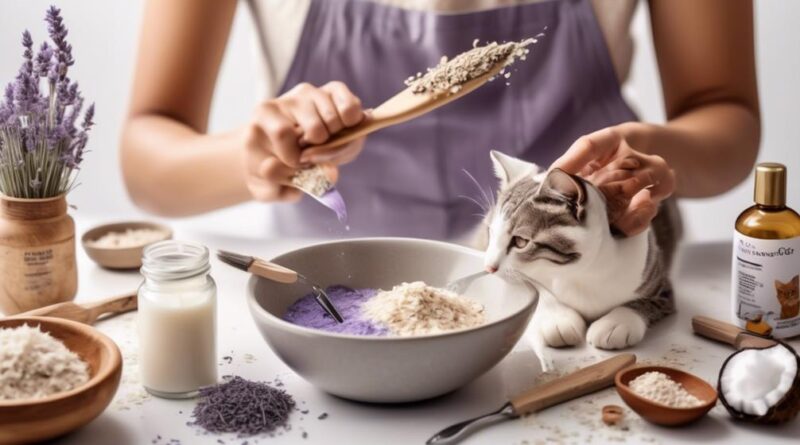Why Use Homemade Cat Grooming Recipes for Natural Fur Care?
If you're a cat owner, you're part of the 42.7 million households in the United States that have a feline friend, according to the American Pet Products Association.
Keeping your cat's fur healthy and well-groomed is essential for their overall well-being, but have you ever considered the benefits of using homemade grooming recipes?
There's a lot more to it than just saving money and reducing your cat's exposure to potentially harmful chemicals.
Benefits of Homemade Cat Grooming Recipes
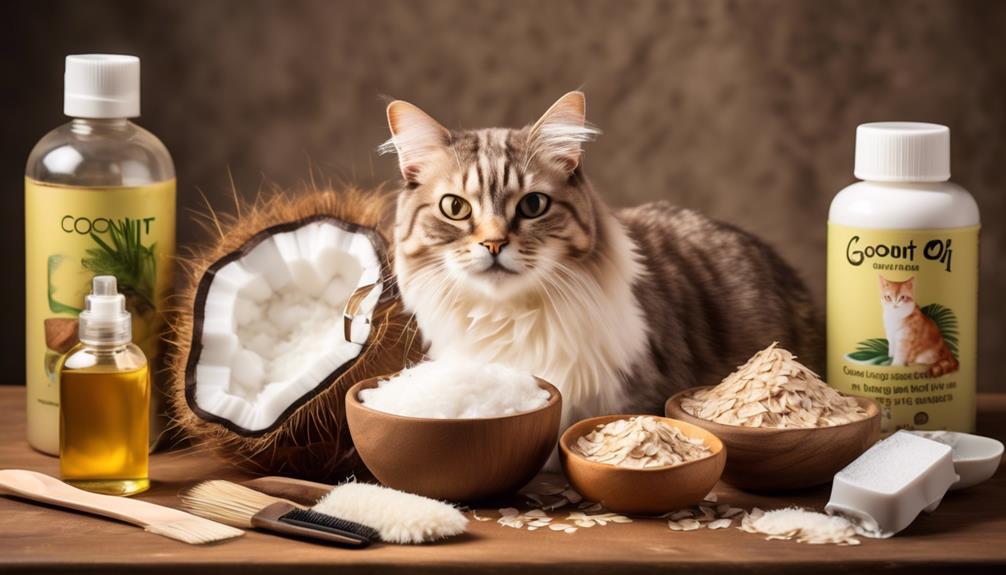
You'll appreciate the cost-effectiveness and peace of mind that homemade cat grooming recipes provide, knowing exactly what ingredients are being used on your feline friend's fur. By using natural ingredients commonly found in your kitchen, you can ensure that your cat's grooming routine is free from harsh chemicals and additives. This not only promotes a healthier coat but also reduces the risk of potential allergic reactions or skin irritations that can result from commercial grooming products.
Moreover, cost savings are a significant advantage of using homemade grooming recipes for your cat. Natural ingredients such as coconut oil, oatmeal, and apple cider vinegar aren't only gentle and effective but are also more affordable than many commercial grooming products. By making your own grooming solutions, you can save money in the long run while still providing your cat with high-quality care.
Additionally, you can customize the recipes to suit your cat's specific needs, whether it's soothing dry skin, detangling fur, or combating fleas.
Essential Ingredients for DIY Cat Grooming
To create effective and natural grooming solutions for your cat, certain essential ingredients are widely recommended. When it comes to DIY cat grooming, using natural ingredients isn't only beneficial for your cat's fur but also safer for their health.
One essential ingredient that's often used in homemade cat grooming recipes is coconut oil. Coconut oil is known for its moisturizing properties and can help keep your cat's fur soft and shiny. It also has antibacterial and antifungal properties, making it a great natural solution for various skin issues.
Another essential ingredient is oatmeal, which is soothing and can help alleviate itching and irritation. Oatmeal can be ground into a fine powder and used in a gentle cat shampoo.
Proper techniques for using these ingredients include ensuring that the oils and other ingredients are well mixed, and the temperature is suitable for your cat's skin. Additionally, it's important to introduce new ingredients gradually to ensure your cat doesn't have any allergic reactions.
When using essential oils, always dilute them properly and avoid using them near your cat's face.
Simple DIY Cat Shampoo Recipe
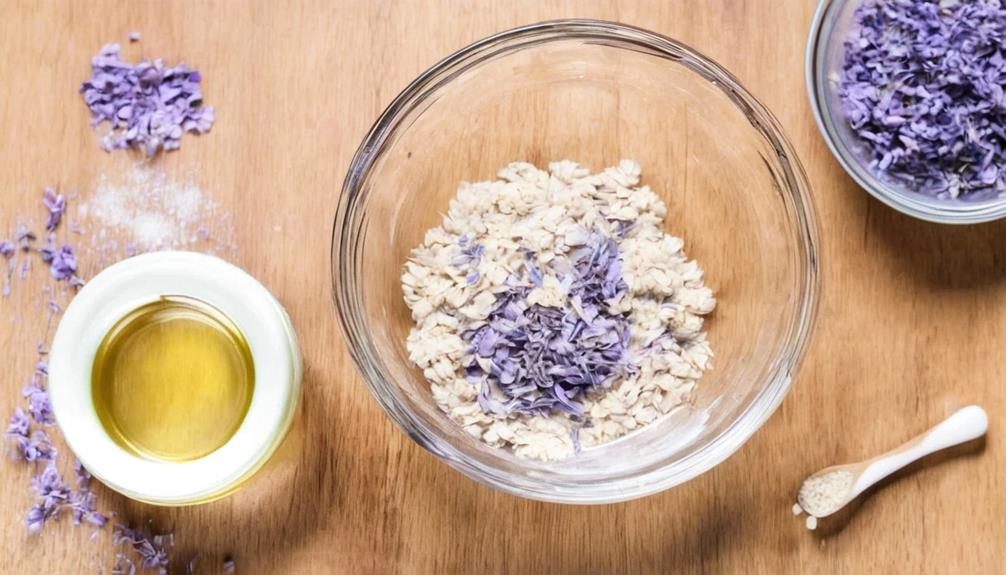
When it comes to maintaining your cat's healthy and lustrous fur, one essential grooming recipe you can easily prepare at home is a simple DIY cat shampoo. Using homemade alternatives for pet care techniques ensures that you know exactly what ingredients are being used on your feline friend's delicate skin, avoiding any potential harmful chemicals found in commercial products.
Here's a simple and effective DIY cat shampoo recipe that will leave your cat's coat clean and shiny, while also being gentle on their skin.
Simple DIY Cat Shampoo Recipe
- Gentle Cleansing: Creating your own cat shampoo allows you to control the ingredients, ensuring it's free from harsh chemicals that may cause skin irritations. This gives you peace of mind knowing that you're using a gentle and safe product on your beloved pet.
- Natural Ingredients: Homemade alternatives often incorporate natural ingredients like mild baby shampoo, coconut oil, and aloe vera, which are known for their moisturizing and soothing properties. Using these natural ingredients can help maintain your cat's fur health without the use of synthetic additives.
- Bonding Experience: Making your own cat shampoo can be a bonding experience for you and your cat. The process of grooming and bathing your cat with a shampoo you've made yourself can strengthen the bond between you and your pet, making it a more enjoyable experience for both of you.
Homemade Cat Conditioner for Silky Fur
For achieving silky fur in your cat, consider creating a homemade conditioner using natural ingredients like coconut oil and aloe vera. Cat haircare can greatly benefit from a gentle and nourishing DIY conditioner that promotes healthy and lustrous fur. Coconut oil is a fantastic natural moisturizer that can help soften and smooth your cat's coat, while aloe vera is known for its soothing and hydrating properties. By combining these two ingredients, you can create a simple yet effective homemade conditioner that will leave your cat's fur feeling silky and luxurious.
To make your homemade cat conditioner, start by melting a tablespoon of coconut oil in a microwave-safe bowl. Once melted, mix in a tablespoon of aloe vera gel to create a smooth and creamy conditioner. After shampooing your cat with a gentle cat-friendly shampoo, apply the homemade conditioner to their fur, focusing on massaging it into the coat. Let it sit for a few minutes to allow the ingredients to penetrate the fur and skin. Then, rinse thoroughly with lukewarm water and gently towel dry your cat.
Using natural ingredients for your cat's grooming routine ensures that you're avoiding harsh chemicals that can strip the fur of its natural oils. This DIY conditioner not only helps in maintaining silky fur but also contributes to overall cat health by providing nourishment to the skin and coat.
DIY Cat Grooming Wipes for Quick Cleanups
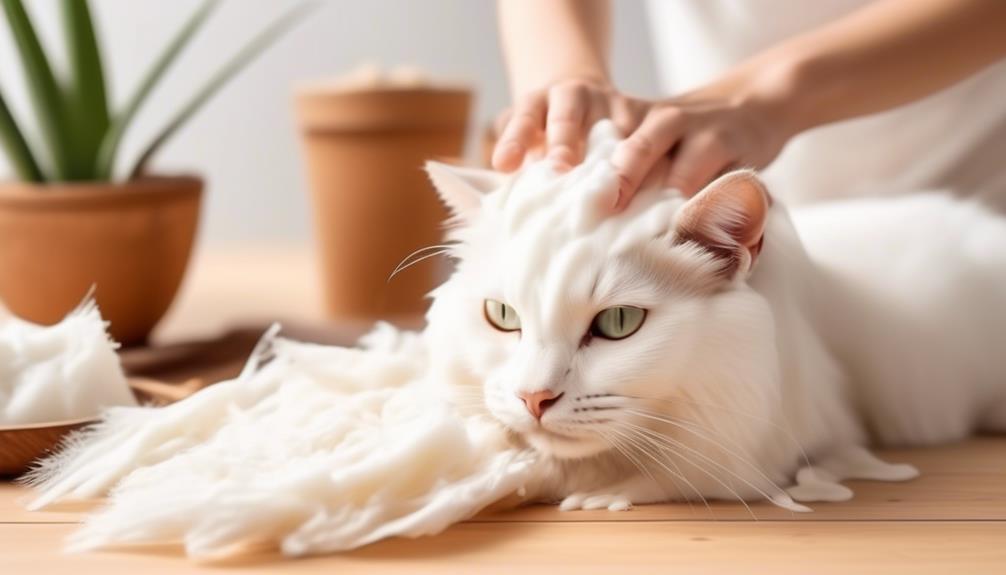
Consider creating your own DIY cat grooming wipes for quick and convenient cleanups using natural and gentle ingredients. Quick grooming wipes aren't only handy for keeping your cat clean and fresh but also provide a bonding opportunity while ensuring your feline friend's well-being.
Here are three reasons why DIY cat grooming wipes can benefit both you and your cat:
- Convenience: DIY grooming wipes are perfect for quick touch-ups in between baths, especially if your cat tends to get into messes or has a knack for finding dirt in the most unexpected places. Having these wipes on hand can save time and effort, making it easier to maintain your cat's cleanliness without the need for a full grooming session.
- Natural Ingredients: By making your own grooming wipes, you have control over the ingredients, ensuring that they're natural and safe for your cat's delicate skin. Natural ingredients such as aloe vera, coconut oil, and witch hazel can help soothe and moisturize your cat's fur while effectively removing dirt and odors.
- Bonding Opportunity: Using DIY grooming wipes gives you a chance to interact with your cat in a calming and positive way. It can be a soothing and enjoyable experience for your cat, strengthening the bond between the two of you while keeping them clean and well-groomed.
Creating your own DIY cat grooming wipes not only promotes quick grooming and natural ingredients but also fosters a closer relationship with your cat through regular grooming sessions.
Natural Flea Repellent for Cats
After ensuring your cat's cleanliness with DIY grooming wipes, it's essential to also protect them from fleas using natural repellent methods. Herbal flea repellents are a safe and effective way to keep these pests at bay without exposing your cat to harsh chemicals.
One of the most popular natural flea control methods is using a herbal flea collar. You can make one at home by mixing a few drops of essential oils such as cedarwood, lavender, or lemongrass with a carrier oil like almond or coconut oil. Apply a few drops of this mixture to a bandana and tie it loosely around your cat's neck. This will help repel fleas and keep your cat smelling fresh at the same time.
Another natural flea repellent for cats is a herbal flea spray. You can create your own by boiling a pint of water and adding a sliced lemon to it. Let the mixture steep overnight, then strain it into a spray bottle. Use this citrus-infused water as a spray on your cat's fur, avoiding the eyes and mouth. The natural acidity and scent of the lemon will help deter fleas from latching onto your cat's coat.
In addition to these herbal remedies, maintaining a clean environment for your cat is crucial for natural flea control. Regular vacuuming and washing of your cat's bedding can help eliminate flea eggs and larvae, preventing infestations.
DIY Cat Hairball Remedy
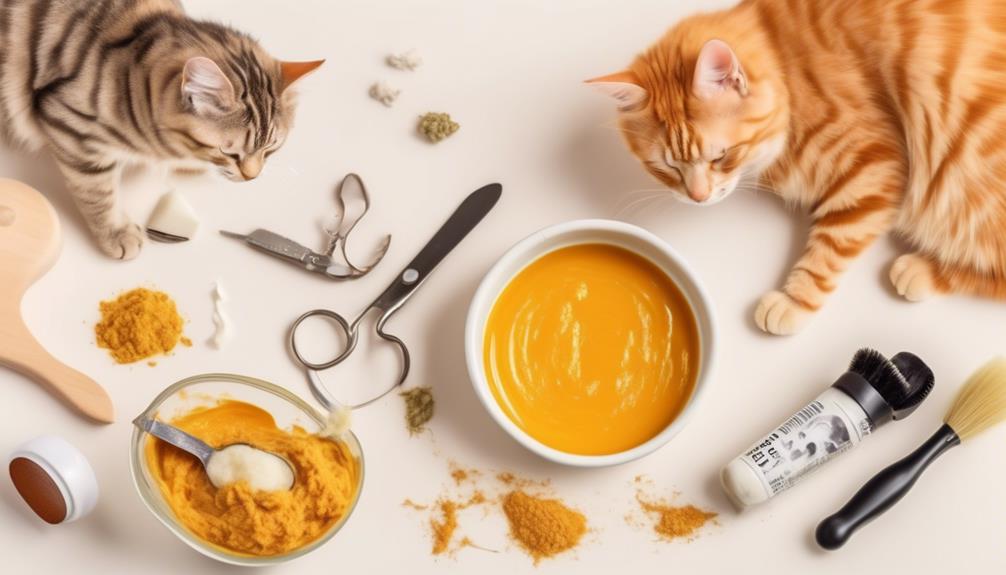
If your cat is experiencing hairball issues, try mixing a teaspoon of plain canned pumpkin into their food to help facilitate digestion and reduce hairball formation. Natural remedies can be highly effective in preventing hairballs and promoting your cat's overall well-being.
Here are a few simple DIY cat hairball remedies that you can try at home:
- Coconut Oil: Adding a small amount of coconut oil to your cat's diet can help lubricate their digestive system, making it easier for them to pass hair through their system and reducing hairball formation. Plus, many cats enjoy the taste of coconut oil, making it an easy remedy to administer.
- Regular Brushing: Regularly brushing your cat helps to remove loose fur from their coat, reducing the amount of hair they ingest while grooming themselves. Not only does this help prevent hairballs, but it also strengthens the bond between you and your feline friend.
- Hydration: Ensuring your cat stays well-hydrated is crucial for preventing hairballs. Consider adding a little water to their food or investing in a cat water fountain to encourage them to drink more. Proper hydration supports healthy digestion and can help prevent hairballs from forming in the first place.
Tips for Safe and Effective Cat Grooming
To ensure your cat's overall well-being and prevent hairballs, it's important to implement safe and effective grooming practices. Safe grooming techniques are essential for maintaining your cat's coat without causing any harm. When brushing your cat, it's important to use gentle and slow movements to avoid causing discomfort or injury. Start by introducing the brush to your cat gradually, allowing them to get used to the sensation before beginning the grooming session. This can help reduce any anxiety or resistance your cat may have towards grooming.
Effective brushing methods are crucial for keeping your cat's fur in top condition. Use a brush that's suitable for your cat's specific coat type to ensure that it effectively removes loose fur and prevents matting. For long-haired cats, a wide-toothed comb can be effective in removing tangles and preventing the formation of mats. Short-haired cats may benefit from a soft-bristle brush that can help distribute natural oils and remove loose fur. Additionally, regular brushing not only helps to keep your cat's coat clean and healthy but also strengthens the bond between you and your feline companion.
Remember to approach grooming with patience and positivity. Always reward your cat with treats and praise to create a positive association with grooming. By implementing safe grooming techniques and effective brushing methods, you can ensure that your cat's grooming experience is comfortable and beneficial for their overall well-being.
Frequently Asked Questions
Can Homemade Cat Grooming Recipes Be Used on All Types of Cats, Including Those With Sensitive Skin or Allergies?
Yes, homemade cat grooming recipes using all natural ingredients can be gentle on sensitive skin and suitable for cats with allergies. It's important to research specific cat breeds and consult a vet for allergy concerns.
Are There Any Potential Risks or Drawbacks to Using Homemade Cat Grooming Recipes Compared to Store-Bought Grooming Products?
When using homemade cat grooming recipes, potential risks include allergic reactions to certain natural ingredients. However, cost savings and natural ingredients are benefits. Always be cautious and test small amounts on your cat's skin first.
How Often Should Homemade Cat Grooming Recipes Be Used to Maintain a Healthy Coat and Skin for My Cat?
To maintain a healthy coat and skin for your cat, use homemade cat grooming recipes regularly. The benefits of regular grooming include improved circulation, reduced shedding, and the prevention of mats and tangles. Aim for grooming every 1-2 weeks.
Can Homemade Cat Grooming Recipes Help With Specific Issues Such as Excessive Shedding or Dry, Flaky Skin?
Homemade cat grooming recipes can be effective for specific issues like excessive shedding or dry, flaky skin. They offer benefits through natural ingredients and DIY grooming solutions, promoting a healthier coat and skin for your cat.
Are There Any Special Considerations or Precautions to Keep in Mind When Using Homemade Cat Grooming Recipes, Especially for First-Time Users?
When using homemade cat grooming recipes, it's important to take precautionary measures, especially as a first-time user. Always test a small area first, monitor for any adverse reactions, and consult a vet if unsure.
Conclusion
In conclusion, using homemade cat grooming recipes for natural fur care has numerous benefits. It allows you to control the ingredients, promotes a healthy and shiny coat, and can save you money.
With simple DIY recipes for cat shampoo, conditioner, grooming wipes, flea repellent, and hairball remedy, you can ensure your cat's grooming routine is safe and effective. Plus, it's a great way to bond with your furry friend while keeping them looking and feeling their best.
